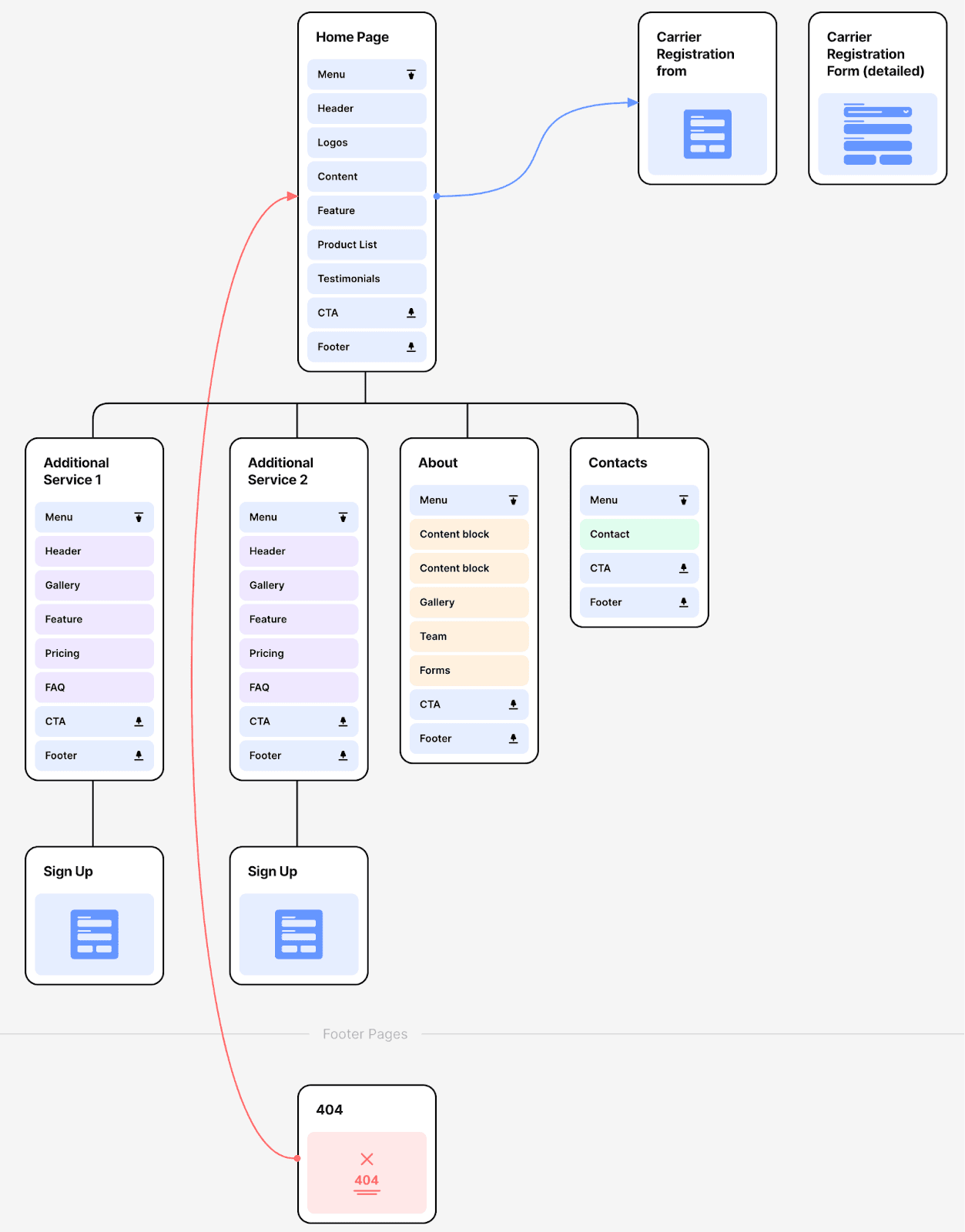Use Case: Onboarding platform MVP for a tech startup
My journey into the world of logistics automation began aboard a ship, quiet literally. While traveling between islands in the Philippines, I received an exciting offer to join a startup in this rapidly growing industry. My role would be Automation Manager – a challenge I eagerly accepted. However, the COVID-19 outbreak threw a curveball, delaying my start date and leaving me stranded (without a computer!) on a beautiful island during lockdown.
Taking the helm: The onboarding challenge
Upon finally starting, I was entrusted with a critical task: Building a streamlined onboarding process for our carrier partners across Europe. This was an opportunity to not only improve efficiency but also to showcase my problem-solving and strategic thinking skills. The key goals were to:
Optimize the manual onboarding process
Improve the document upload process
Develop a user-friendly carrier portal with access to:
A step-by-step guide that walks carriers through the entire onboarding process, from initial application to activation their account
A searchable knowledge base packed with answers to frequently asked questions. Carriers can easily find the information they need without having to contact support
The ability to sign up for additional services
Uncharted waters: Adapting to change
Just as I was setting sail, things shifted – a new manager and a switch to Salesforce Pardot. While initially excited to learn this new tool, I encountered limitations compared to my prior Marketing Cloud experience. However, I knew I needed to be resourceful.
Charting a course: uilding the MVP
Understanding the brand's vision for integrating onboarding and services into a central carrier platform, I focused on developing a Minimum Viable Product (MVP) as a reference point for the product team. Through discovery meetings with account managers, I identified pain points in the manual process.
Embracing new horizons: The power of Webflow
Initially, landing pages that the company used so far were built with Instapage, which wasn't ideal. Recognizing the need for a more complex solution, I championed Webflow, a platform I was familiar with. Webflow's drag-and-drop interface and multisite capabilities allowed me to create a user-friendly platform that could easily adapt to different European regions.

JotForm: Building efficient forms
With limited developer resources, JotForm became my go-to solution for building professional-looking sign-up forms. JotForm's features, including drag-and-drop functionality and built-in document upload, streamlined the process and ensured GDPR compliance.
Connecting the dots: Integrating tools
While JotForm offered a convenient way to collect documents, limitations arose when integrating directly with Salesforce. Uploading multiple files in one go wasn't supported. To overcome this hurdle, we devised a two-step solution:
JotForm to Google Sheets: We integrated JotForm with Google Sheets using a formula to split uploaded files into individual entries within the spreadsheet.
Google Sheets to Salesforce with Zapier: Finally, we leveraged Zapier, a powerful automation tool, to seamlessly transfer the separated files from Google Sheets into Salesforce. This ensured all uploaded documents were successfully integrated into the CRM system.
Marketing automation: Setting sail for success
Simplifying the onboarding journey was key. We created a short sign-up form followed by a completion action - welcome email directing carriers to a detailed form, carrier information page, and optional add-on services. A few days later, in Engagement Studio, a follow-up email with partnership details and a link to the in-depth form with document uploads was sent.
Automating this process led to a significant improvement in onboarding completion rates. Carriers were more comfortable uploading documents earlier, freeing up our team from chasing documents and allowing them to focus on welcoming new partners.
Customer satisfaction tracking with automation
We took the onboarding experience to the next level by automating a feedback system. A friendly email automatically popped up after onboarding, asking customers to quickly rate their experience with a short survey.
For those impressed by the process (ratings above 8), we politely requested a review on Google Maps and Trustpilot. This system ensured everyone's voice was heard, providing valuable insights for our product team to optimize the onboarding process.
The best part? Our average ratings on both platforms soared by 48%! These glowing reviews are a gold mine for attracting new customers and keeping existing ones happy. In the end, positive online reviews are like a stamp of approval in today's digital world!
Seeing the bigger picture: Increased service adoption
Providing carriers with direct access to additional services within their portal proved highly effective. Constant exposure to these services during the onboarding process educated carriers about the benefits of a full partnership with our company, leading to a higher adoption rate of add-on services.
The final voyage: Growth and impact
After successfully developing the entire user flow, my contributions were recognized, and I was promoted to Acquisition Program Manager. In this new role, I shouldered the responsibility of acquiring as many new carriers as possible. We embraced growth hacking techniques, leveraging social media scraping tools on platforms like Facebook and utilizing Google information scrapers to identify potential partners. These efforts consistently surpassed established KPIs, significantly contributing to the company's growth trajectory resulting in a 300+% increase in our carrier base over a year.
During my time at the startup, I witnessed incredible growth. The company skyrocketed, acquiring two major European players. While the original solution I built was eventually replaced by internal tools, colleagues informed me that elements of it continued to be used for “a longer while” after my departure. This feedback reinforced the value of MVPs in validating features and informing future development.
Even in a fast-paced startup environment with constant change, wearing multiple hats can be incredibly rewarding. This experience not only equipped me with valuable skills in Pardot and automation but also highlighted the importance of resourcefulness, adaptability, and the power of low-fidelity prototypes in driving impactful solutions.


